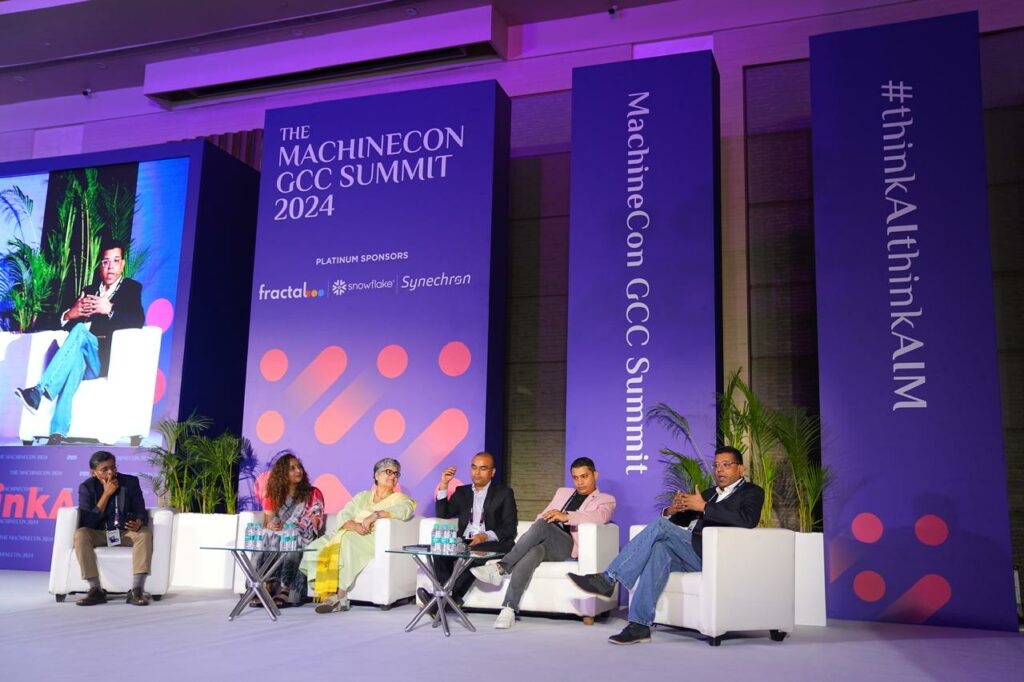As artificial intelligence evolves at a rapid rate, organisations across sectors are wrestling with the difficulties and possibilities posed by generative AI technology. AIM Media House held MachineCon 2024, where industry professionals discussed the present level of generative AI adoption, its influence on diverse industries, and the roadmap for future deployment.
The panel, featuring executives Shashank Garg CEO at Infocepts, Sheenam Ohrie Managing Director at Broadridge , Anirban Nandi Head of AI Products & Analytics (Vice President) at Rakuten India , Kalpana Balasubramanian CEO and Chief Thinker at Grant Thornton, Amod Deshpande Country Managing Director, India at AlphaSense , Madhu Hosadurga Global Vice President, Enterprise AI at Schneider Electric, provided insights into how organizations are leveraging generative AI to drive innovation, improve efficiency, and create new value propositions.
The current state of adoption
A quick poll of the audience indicated that a large number of participants had already implemented generative AI in some form, with others aiming to do so within the next year. This reflects the wider industry trend, in which businesses are increasingly researching and adopting AI technology into their operations.
Real-world applications.
Generative AI is being used in a variety of fields:
AI-powered solutions are utilised in financial services to get insights into bonds, manage internal information, and improve operational efficiency. These technologies also help create personalised product descriptions and improve consumer experiences on e-commerce platforms.
The energy management and industrial automation sectors are using generative AI for HR queries, knowledge management, last-mile automation, and content generation for large product catalogues.
In the field of market research and analytics, generative AI is used for document summarising, intelligent search help, and giving personalised insights to users.
Challenges and Considerations
While the potential of generative AI is immense, several challenges were highlighted:
Data Security and Privacy: The security of sensitive information while employing AI systems is critical. To ensure data confidentiality, several organisations are implementing one-way Enterprise AI versions.
Ethical and Legal Considerations: As AI becomes more popular, there is a greater demand for ethical AI frameworks. This involves dealing with difficulties like prompt injections, information toxicity, and biases in AI-generated material.
Integration and Experimentation: Organisations are adopting organised ways to managing AI experimentation, ensuring that projects progress from concept to production while adhering to security and legal guidelines.
Balancing Innovation and legislation: As technology advances fast, businesses must negotiate the complicated world of AI legislation while being innovative.
Future Outlook
Looking ahead, the panellists anticipated five major advances in the generative AI space:
- Focus on Tangible Outcomes: As organisations move beyond testing, they will prioritise actual commercial outcomes from their AI programmes.
- Language Model Advancements: Continued development of more efficient and competent language models, perhaps leading to a move towards more agentic AI capable of performing autonomous tasks.
- Ethical & Responsible AI: There is a rising emphasis on making AI systems ethical, responsible, and beneficial to society.
- Sustainability Considerations: As AI systems consume large amounts of computing resources, there will be a greater emphasis on their environmental effect and long-term sustainability.
- Rekindling Interest in Languages: As AI advances, there may be a renewed interest in human languages and their intricacies.
The conversation focused on the revolutionary potential of generative AI across sectors. As organisations continue to investigate and apply new technologies, the emphasis will be on responsible innovation, demonstrable commercial benefits, and resolving any ethical or practical difficulties that arise. The next few years will bring further discoveries and applications, with generative AI set to play an increasingly important role in determining the future of corporate technology.










